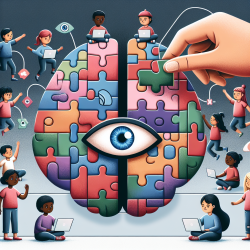Introduction
In the ever-evolving field of psychological interventions, continuous skill enhancement is crucial. The recent study titled "Perspectives on competency-based feedback for training non-specialists to deliver psychological interventions: multi-site qualitative study of the EQUIP competency-based approach" offers insightful perspectives on how competency-based feedback can significantly improve the training of non-specialists. This blog will delve into the key findings of the study and discuss how practitioners can leverage these insights to enhance their skills and improve outcomes for children.
Understanding Competency-Based Feedback
Competency-based feedback is a structured approach that focuses on specific skills and competencies that trainees must demonstrate. The EQUIP platform, developed by the World Health Organization and UNICEF, provides standardized tools to assess these competencies. The study highlights four main themes that illustrate the benefits of this approach:
- Personalized and Goal-Specific Feedback: Feedback is tailored to individual needs, helping trainees identify areas for growth and providing actionable steps for improvement.
- Support for a Feedback Loop: Continuous and timely feedback creates a loop that reinforces learning and skill development.
- Comfortable and Objective Environment: Structured feedback reduces subjectivity and makes challenging feedback more palatable.
- Flexibility in Training and Supervision: Feedback can be delivered in various formats, accommodating different learning styles and preferences.
Implementing Competency-Based Feedback in Practice
For practitioners at TinyEYE and beyond, incorporating competency-based feedback into training and supervision can lead to significant improvements in skill acquisition and client outcomes. Here are some practical steps to consider:
- Utilize Structured Assessment Tools: Leverage tools like those provided by EQUIP to assess competencies systematically.
- Focus on Actionable Feedback: Provide specific examples and role-play scenarios to help trainees understand and improve their skills.
- Encourage Bidirectional Feedback: Foster an environment where trainees feel comfortable providing feedback to trainers, enhancing the training process.
- Adapt to Different Learning Styles: Offer feedback in various formats, such as group sessions or individual meetings, to suit different preferences.
Encouraging Further Research
While the study provides valuable insights, it also highlights the need for further research to explore the long-term impact of competency-based feedback on client outcomes. Practitioners are encouraged to engage in ongoing research and contribute to the growing body of evidence supporting this approach.
Conclusion
Competency-based feedback is a powerful tool for enhancing the skills of non-specialists delivering psychological interventions. By implementing the findings from the EQUIP study, practitioners can improve their training processes and ultimately create better outcomes for children. For those interested in diving deeper into the research, the original paper provides a comprehensive overview of the study's methodology and findings.
To read the original research paper, please follow this link: Perspectives on competency-based feedback for training non-specialists to deliver psychological interventions: multi-site qualitative study of the EQUIP competency-based approach.










